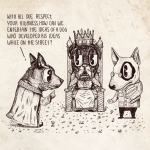Philip Roth, Everyman . Boston: Houghton Mifflin, 2006. 182 pp. Paperback, $13.00. When Death comes to fetch him in the medieval morality play, Everyman is abandoned by Friends, Kin, Beauty, and Goods. At least Good Works, purified through penance, accompanies him and gives access to heaven. Philip Roth’s Everyman, the unnamed central character in Roth’s twenty-seventh novel, lacks even this comfort. Estranged from his two sons, envious of his vigorous older brother, three-time divorcee, alternately plagued by regrets and defensive... Read more



















